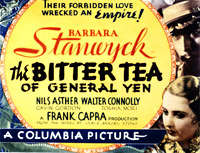My 1933 list has a certain amount of “le fantastique” about it, which seems odd given the Depression setting. But that’s how it rolled. A few social-issue movies came close to making the cut; you could almost say that 42nd Street, which just barely missed, is truly the representative film of the year, a hot-off-the-presses slice of genre that reeks of its breadline era.
 But my #1 title is a singular film from a director known for other kinds of movies, created with the kind of brio that says, “You want to see film directing? I’ll give you film directing!” But for all his Oscar-courting ambition, Frank Capra also managed to make every frame of The Bitter Tea of General Yen throb with care and provocation. I write about it more here. Of course, you can’t (and wouldn’t want to) avoid King Kong, which in its own way is very much of its era and place. Meanwhile, in Germany, a couple of great careers (Max Ophuls just gearing up, Fritz Lang coming off his early peak) were about to leave a country sliding toward horror, part of an exodus that would enrich Hollywood over the next few decades. 1933’s ten best:
But my #1 title is a singular film from a director known for other kinds of movies, created with the kind of brio that says, “You want to see film directing? I’ll give you film directing!” But for all his Oscar-courting ambition, Frank Capra also managed to make every frame of The Bitter Tea of General Yen throb with care and provocation. I write about it more here. Of course, you can’t (and wouldn’t want to) avoid King Kong, which in its own way is very much of its era and place. Meanwhile, in Germany, a couple of great careers (Max Ophuls just gearing up, Fritz Lang coming off his early peak) were about to leave a country sliding toward horror, part of an exodus that would enrich Hollywood over the next few decades. 1933’s ten best:
1. The Bitter Tea of General Yen (Frank Capra)
2. King Kong (Merian C. Cooper and Ernest B. Schoedsack)
3. Zero for Conduct (Jean Vigo)
4. Liebelei (Max Ophuls)
5. Duck Soup (Leo McCarey)
6. Wild Boys of the Road (William Wellman)
7. Design for Living (Ernst Lubitsch)
8. The Invisible Man (James Whale)
9. Las Hurdes (Luis Bunuel)
10. The Testament of Dr. Mabuse (Fritz Lang)
I wanted to include Wellman’s Heroes for Sale with his other title, but I’m trying to cut down on putting 13-14 films on a ten best list. Ahem. Also, this list is unusual for me for including two non-feature-length movies, because I’ve been sticking to features in drawing up these things. But Zero for Conduct is special, a beauty from the short-lived director who will take the #1 slot when I get around to doing a 1934 list; and Las Hurdes is a film that shakes your idea of what a documentary is. I can’t live without the Marx Brothers, and The Invisible Man, delightful for many reasons, is maybe the “most English” of James Whale’s pictures.
Next week: 1994.
Filed under: Year by Year Best Movies | Tagged: 1933 Ten Best Movies, The Bitter Tea of General Yen | Leave a comment »




